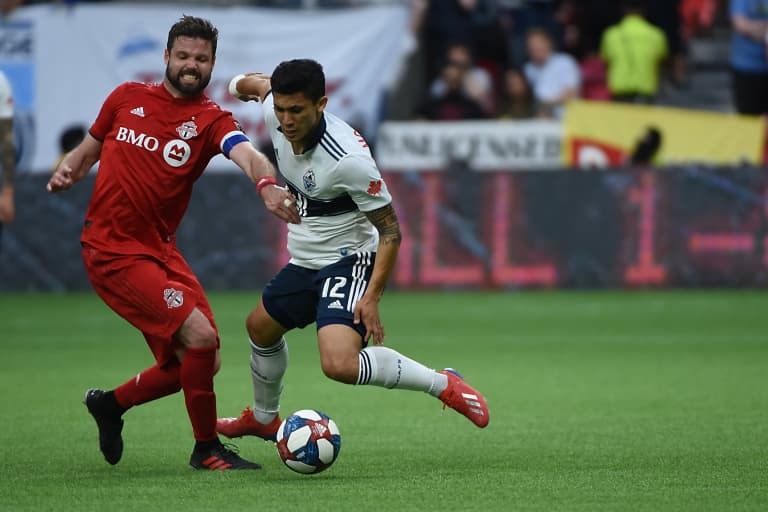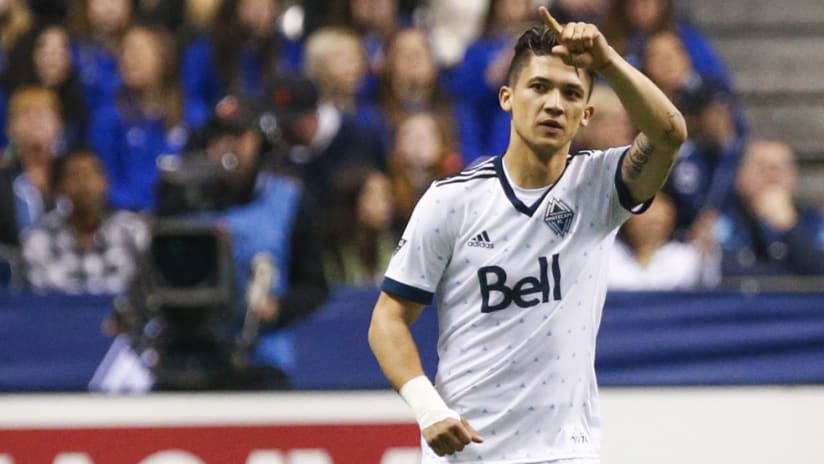Rivalries are polarizing by nature – it’s us or them, and precious little room for gray areas in between. But Fredy Montero’s case is a bit unconventional in that regard.
The Colombian striker is in his third season with the Vancouver Whitecaps and has found the City of Glass to be a happy home. But he retains deep ties to Seattle, where he was one of the Sounders’ first stars of their MLS era, scoring 47 goals and 34 assists in 119 regular-season matches from 2009-12. He remains the all-time leading scorer in Rave Green history, though he now shares that honor with Clint Dempsey.
Though he moved on to European adventures with Portuguese powers Sporting Lisbon and a stint in China at Tianjin Teda, Montero met his wife Alexis in Washington State and they are co-owners of Santo Coffee Co., a hip coffee shop in Seattle’s Roosevelt neighborhood. It’s given him a unique perspective on the two clubs’ cross-border rivalry.
“In the beginning, back in 2017 [when he returned to MLS to join the ‘Caps], I was concerned about people questioning my loyalty to the team. [But] I'm focused,” Montero told MLSsoccer.com. “I'm trying to win every single game, I don't mind who is in front of me.”
Perhaps his Sounders past is a factor in his approach to the Cascadia Cup, a competition in which he’s scored some huge goals over the years but has only gotten to lift once, with Seattle in 2011. He says the Portland Timbers are his favorite Cascadia opponents, and believes that what makes the history-laden regional tournament so compelling is the heavy presence of traveling supporters in those matchups, a factor that North America’s sprawling geography often tends to limit in more typical MLS games.
It’s not just that away support boosts visiting teams – it can also light a fire under hosts who hate to hear someone else’s songs and chants in their stadium.
“When you have many fans traveling for your team, they don’t want to lose, and that energy is receiving by us in the field. So I appreciate that,” he said. “And of course you don't want to lose when you see how many fans are traveling. No way. Especially when we're playing at home, we want to win because Seattle’s fans and Portland’s fans are always loud in our stadium.”
Interestingly, Montero’s time in British Columbia has led him to the conclusion that Whitecaps fans get even more fired up for cross-Canadian showdowns than Cascadia ones – particularly meetings with Toronto FC.

Vancouver Whitecaps forward Fredy Montero (right) battles with Toronto FC's Drew Moor for possession in a match on May 31, 2019 | USA Today Sports
“Toronto – that’s a must-win game, or at least don’t lose,” he noted.
Despite his migration to the blue side of the 49th parallel, Montero remains a mostly respected figure on Puget Sound, and he expresses gratitude at the Seattleites who have continued to patronize Santo as it keeps limited hours during the coronavirus crisis that has taken a heavy toll on so many businesses around the world.
“Especially in these days, trying to manage a coffee shop, my first business in the US, it’s hard,” he said. “Right now we're only open on Saturdays and Sundays, only to takeaway. We’re trying to adapt to this time. We are selling on a mobile app, so people now can order coffee ahead and can just walk in and grab whatever they order. And we have a lot of loyal customers that have been supporting our business, and we are really thankful and grateful for that.”
Montero turns 33 this year, and has to fight harder than ever for playing time in a Whitecaps front line that also includes Yordy Reyna, Homegrown Theo Bair and newcomers Lucas Cavallini and Cristian Dajome. He says he believes he’s got at least four more seasons left in his legs, however – “I believe that I'm in my prime,” he declared – and his evolution with age suggests that he can also be impactful in withdrawn and playmaking roles, not just as an out-and-out frontrunner.
“When I first came to MLS,” he said, “I was more selfish. I was young, full of energy, trying to prove myself to everybody. Now, I know what I'm capable of, what I'm not capable of as well. That makes you a better player. … When I have opportunities, I don't waste them like I used to do in the past, I needed four or five opportunities to score one or two goals.
“My whole career, I always say that I am a playmaker first, and then a goalscorer after. When things are not going good for the team, we’re struggling to hold the ball, to bring the ball up top to the striker, I'm not that kind of striker that’s always cherry-picking. No, I like to come back, get the ball, get in contact, tried to make something happen.”
He did recently cast one eye toward his post-playing career, telling VWFC’s website that he’d like to someday give the other football a shot, as a placekicker. It turns out that his exposure to the NFL’s Seahawks and some casual kickarounds with gridiron types planted a seed of sorts.
“Yeah, I have a few friends that play football,” he explained, “and they put in my mind that I have a strong kick and I should try out. … Why not? If I got the right coach that can show me how to do it, it’s something that I'm going to keep in mind when I retire from soccer.”
He admits he’ll have to spend some time picking up the details.
“When I came from Colombia, I didn't know anything about this sport,” he added. “Over the years, I've been developing this interest in learning all the rules – there are so many! But I've been getting most of them. Not all of them, but most of them.”













